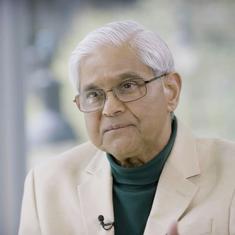Casting director accuses actor and Kerala MLA Mukesh of sexually harassing her 19 years ago
In a Twitter thread, the woman recounted an incident during her time as the director of a Malayalam television show hosted by the actor.

A Mumbai-based casting director on Tuesday accused Malayalam actor Mukesh on Twitter of sexual harassment. She said the incident took place 19 years ago. Mukesh is now a Communist Party of India (Marxist) MLA and represents Kollam constituency.
I was 20 years old quiz directing #koteeswaran when the mallu host #mukeshkumar called my room multiple times and then changed my room to beside his on the next sch. My then boss @derekobrienmp spoke to me for an hour & got me out on the next flight. 19 yrs on thank you Derek.
— Tess Joseph (@Tesselmania) October 9, 2018
The woman claimed that during her time as director of a Malayalam television show, Mukesh had called her hotel room a number of times. She was the only woman in the crew, which was stationed in Chennai’s Le Meridien Hotel. Mukesh, who was hosting the show, asked hotel authorities to change her room to one next to his, she claimed.
The woman said she immediately contacted her then boss Derek O’Brien, who is now a Trinamool Congress leader. Thanking him for “timely intervention”, she said O’Brien arranged an air ticket after which she returned to Mumbai the same night.
On Wednesday, Mukesh told reporters that he did not remember nor would he be able to recognise the complainant in a photograph. “I never misbehaved with anyone over phone,” Mukesh said. “I am not that type of a person [who misbehaves with women]. Someone may have misguided the complainant. Someone named Mukesh may have called her [while she was working on the shoot] but it was not me.”
The Kerala MLA said he was from a “family of artistes” and that he supports the #MeToo campaign. “Women should respond immediately if they face sexual harassment,” Mukesh said. “Then only we will get more women artistes.”
Kodiyeri Balakrishnan, Communist Party of India (Marxist) state secretary, told Scroll.in that the party will legally examine the allegations against the actor. “All allegations must not be true,” the party official said.
I want to say this to every hotel, every crew member who has allowed and been party to enabling predators - you are a huge part of this is #TimesUp
— Tess Joseph (@Tesselmania) October 9, 2018
The allegations against the actor-turned-politician come at a time when several women, including journalists, have taken to social media to give detailed accounts of the sexual harassment and misconduct they faced. The campaign, being dubbed as the #MeToo movement in India, has taken the media fraternity by storm as several senior journalists, writers and media professionals have been accused of misconduct.
On Monday, writer, director and producer Vinta Nanda alleged that actor Alok Nath raped her at her home nearly two decades ago after he was sacked from the 1990s popular television show Tara for misbehaving with its lead actress, Navneet Nishan. Later, Nishan confirmed sthe actor in question had harassed her. “I dealt with the four-year harassment by slapping the man in question and it is done and dusted,” said Nishan, without naming Nath.
Four journalists also made allegations of sexual harassment against veteran journalist and now the Minister of State for External Affairs, MJ Akbar.
Several Twitter users on Monday accused Tamil poet-lyricist Vairamuthu of inappropriate conduct and sexual abuse. Singer Chinmayi Sripaada later backed the allegations of sexual harassment against him.
Director Vikas Bahl, former Hindustan Times political editor Prashant Jha, actor Rajat Kapoor, Kashmiri journalist Fahad Shah, stand-up comedian Utsav Chakraborty and author Chetan Bhagat are among those who have been accused of sexual misconduct in the past few days.
DISCLOSURE:
In view of the statements of women who have made public their experiences of journalist Mayank Jain’s misconduct, we at Scroll in the spirit of fair disclosure would like to state that Mayank Jain worked for Scroll from October 15, 2014 to October 30, 2016, and then from June 12, 2017 to December 31, 2017.
A woman employee informally and verbally brought to the attention of a member of the internal complaints committee (ICC) at Scroll an instance of sexually inappropriate online behaviour by Mayank Jain in 2017. The employee, however, did not want to pursue the matter through a formal written complaint, without which no formal inquiry can be initiated. Despite this, the ICC took serious note of the matter and served a written warning to Mayank Jain, reminding him of Scroll’s strict policies prohibiting sexual harassment.
We, at Scroll, commit to continuing to better understand women’s experiences at the workplace and evolve further processes that may be required to prevent, acknowledge and respond to work cultures that are not enabling for women.
NOTE:
This article includes only those accounts in which the women have chosen to name themselves and their alleged harassers or in cases which there have been multiple accusations against one person. Scroll.in reporters are continuing to report the story, including efforts to corroborate and cover the cases where the women have chosen to be anonymous.









